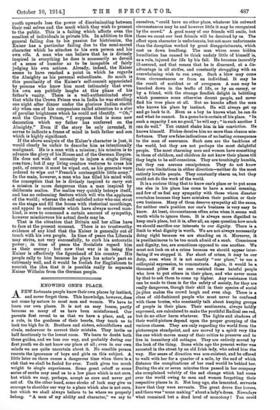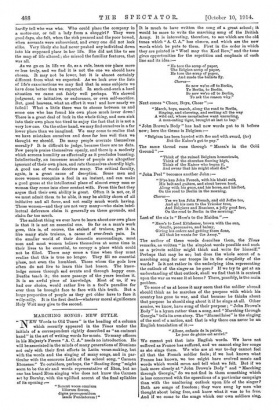KNOWING ONE'S PLACE.
AFEW fortunate people know their own places by instinct, and never forget them. This knowledge, however, does not come by nature to most men and women. We have to learn our own places. It is not an easy lesson, partly because so many of us have been misinformed. Our parents first reveal to us that we have a place, and, as a rule, in the goodness of their hearts, they teach us to look too high for it. Brothers and sisters, schoolfellows and rivals, endeavour to correct their mistake. They invite us half facetiously to the lowest room. We learn to doubt both these guides, and we lose our way, and probably during our first youth we do not know our place at all ; even in our own minds we are quite uncertain about it. No sensible person resents the ignorance of boys and girls on this subject. A little later on there comes a dangerous time when there is a risk that we shall be fooled for ever. Youth gives too much weight to single experiences. Some great rebuff or some series of snubs may send us to a low place which is not ours, but which we may, perhaps, accept as ours and never get out of. On the other hand, some stroke of luck may give us courage to shoulder our way to a place which also is not ours, but which we shall always believe to be where we properly belong. " A man of my ability and character," we say to ourselves, " could have no other place, whatever his outward circumstances may be and however little it may be recognized by the crowd." A good many of our friends will smile, but those we count our best friends will be deceived by us. The effect upon character is unfortunate, but not more unfortunate than the deception worked by great disappointments, which cast us down headlong. The man whom some hidden humiliation has caused to think unduly little of himself is, as a rule, injured for life by his fall. He becomes incurably ill-assured, and that means that he is disarmed, at a dis- advantage in all strifes, and constantly struggling with an overwhelming wish to run away. Such a blow may come from circumstances or from an individual. It may be the result of accident or of arrogance. A man may be knocked down in the traffic of life, or by an enemy, or by a friend, with the strange fiendish delight in belittling which possesses some otherwise decent people, and never find his true place at all. But no knocks affect the man who knows his place by instinct. He will always get up and go back to it. Even as a boy he knows what he can do and what he cannot. In a game be is certain of his place. "In such a capacity I am no good," he will say ; " in such another I can do well." You cannot shake him in his conviction. He knows himself. Flukes deceive him no more than chance mis- fortunes. They are false indications of no lasting consequence to the man of assurance. Such men are the backbone of the world, but they are not perhaps the most delightful people. The most charming men and women have something in them of children, and children do not know their places till they begin to be self-conscious. They are touchingly humble, yet they can assume omnipotence. They do not know their own limitations in either direction—neither do the most entirely lovable people. They constantly charm us, but they could not do the work of the world.
It is a curious thing that to know one's place or to put some one else in his place has come to have a social meaning, and few of us feel any sympathy with those whom disaster overtakes because they have mistaken their position or their own business. Many of them deserve sympathy all the same, for neither one's position nor one's business is very easy to know. At least, circumstances often arise when it seems well worth while to ignore them. It is always more dignified to keep one's place, but it is, after all, an open question how much we should sacrifice our interests to our dignity. There is a limit to what dignity is worth. We are not always necessarily doing right because we are standing on it. Moreover, it is pusillanimous to be too much afraid of a snub. Conscience and dignity, too, are sometimes opposed to one another. We must not look on at a crime because we should appear inter- fering if we stopped it. Far short of crime, it may be our duty, even when it is not exactly " our place," to use a colloquial expression, to remonstrate. Again, it would be a thousand pities if no one resisted those hateful people who love to put others in their place, and who never mean by that to ask them to come up higher. Any resistance that can be made to them is for the safety of society, for they are really dangerous, though their skill in their species of social ju-jitsu makes the crowd laugh and even clap. There is a class of old-fashioned people who must never be confused with these brutes, who constantly talk about keeping groups of people in their place. Their sentiments, always boldly expressed, are calculated to make the youthful Radical see red, but do no other harm whatever. The lights and shadows of their world-picture depend upon the proper grouping of the various classes. They are only regarding the world from the picturesque standpoint, and are moved by a spirit very like the one which moves many of their critics to preserve and to live in insanitary old cottages. They are entirely moved by the look of the thing. Some while ago the present writer was accosted in the street by an old Irish lady, who asked him the way. Her sense of direction was non-existent, and he offered to walk with her for a quarter of a mile, by the end of which distance the complications of her road would be behind her. During the six or seven minutes thus passed in her company she complained volubly of the sad change which had come over the world owing to men and women forgetting their respective places in it. Not long ago, she lamented, servants knew that they were servants. The great drove fine horses, and there was "some making " about a lady's dress. Nowadays what remained bet a dead level of monotony I You could
hardly tell who was who. Who could place the company in a motor-car, or tell a lady from a shopgirl P They were good days, she felt, when the rich pranced and the poor bowed, when servants were subservient, and every one did not look alike. Very likely she had never pushed any individual down into his supposed place in her life. She did not like to see the map of life altered ; she missed the familiar features, that was alL
As we go on in life we do, as a rule, learn our place more or less truly, and we find it is not the one we should have chosen. It may not be lower, but it is almost certainly different from what we expected. As we look over the lists of life's examinations we may find that in some subjects we have done better than we expected. In such-and-such a bard situation we came out fairly well perhaps. We showed judgment, or initiative, or endurance, or even self-sacrifice. But, good heavens, what an effort it was ! and bow nearly we failed! What a little there was to choose between us and some one who has found his own place much lower down! There is a great deal of luck in the whole thing, and men sink into their own place too tired to enjoy the fact that it is not a very low one. On the other hand, we may find ourselves in a far lower place than we imagined. We may come to realize that we have mistaken ourselves and done far less well than we thought we should. Do many people overrate themselves morally P It is difficult to judge, because there are no data. Few people praise themselves openly, and there is a modesty which screens humility as effectually as it precludes boasting. Intellectually, an immense number of people are altogether ignorant of their own place, and rate themselves absurdly high. A good use of words deceives many. The critical faculty, again, is a great cause of deception. Some men and more women recognize a fool in an instant, and can make a good guess at the intellectual place of almost every man or woman they come into close contact with. From this fact they argue that their own ability is great. Often it is not, or, if we must admit them to be able, it may be ability shorn of all initiative and all force, and not really much worth having. Those women—and they are not very many—who claim intel- lectual deference claim it generally on these grounds, and claim far too much.
The saddest thing we ever have to learn about our own place is that it is not an essential one. So far as a man's work goes, this is, of course, the stalest of truisms, yet it is, like many stale truisms, a cause of ever-fresh pain. In the smaller world of their domestic surroundings, most men and most women believe themselves at some time in their lives to be essential, to occupy a place which could not be filled. There may come a time when they must realize that this is true no longer. They fill no essential place, not even the humblest. Those whom the gods love often do not live to learn this last lesson. The know- ledge comes through sad events and through happy ones. Deaths teach it; the mere passage of the years teaches it. It is an awful piece of knowledge. Most of us, if we bad our choice, would rather live in a fool's paradise for ever than be brought face to face with this truth. But a large proportion of people as they get older have to face it willy-nilly. It is the first death—whatever moral significance Holy Writ may give to the second.



































 Previous page
Previous page